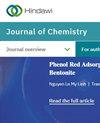Antimicrobial Evaluation of Anthraquinones and Preanthraquinone from the Root Extract of Aloe kefaensis
IF 2.6
4区 化学
Q2 CHEMISTRY, MULTIDISCIPLINARY
引用次数: 0
Abstract
The aim of this study was to isolate antimicrobial compounds from the roots of Aloe kefaensis, a plant endemic to Ethiopia and used to treat various microbial infections by traditional healers. The air-dried and powdered plant material was sequentially extracted with petroleum ether, dichloromethane, acetone, and methanol. Then, each solvent extract was evaluated for its in vitro antimicrobial activity against four bacterial (Escherichia coli, Bacillus cereus, Salmonella typhimurium, and Staphylococcus aureus) and one fungal (Candida albicans) strains using the agar disk diffusion method. Superior antimicrobial activity was exhibited against all the strains by dichloromethane extract, with the highest activity observed against S. typhi (inhibition zone diameter of 23.0 mm at 200 mg/mL). Due to similarity in their TLC profile, the acetone and dichloromethane extracts were combined and subjected to silica gel column chromatography for fractionation and isolation of the compounds. Separation of these extracts using silica gel column chromatography resulted in four anthraquinones: deoxyerythrolaccin (1), chrysophanol (2), laccaic acid D-methyl ester (3), and 3, 8-dihydroxy-1-methylanthraquinone-2-carboxylic acid (4) and one preanthraquinone, aloesaponol II (5). The structure of these compounds was established using NMR (1D and 2D) spectroscopic analysis and comparison with reported literature data. The isolated compounds were evaluated for antimicrobial activity and showed varying degrees of potency. Compounds 2 and 4 showed the highest activity against Salmonella typhimurium at 10 mg/mL, with a zone of inhibition of 28.5 and 25.0 mm, respectively, in comparison to gentamicin (26.0 mm inhibition zone diameter at 10 mg/mL). Therefore, this strong antimicrobial activity of the extracts and isolates supports the traditional usage of Aloe kefaensis to treat microbial diseases.芦荟根提取物中的蒽醌和前蒽醌的抗菌评估
这项研究旨在从 Aloe kefaensis 的根部分离出抗菌化合物。Aloe kefaensis 是埃塞俄比亚特有的一种植物,传统医学家用它来治疗各种微生物感染。风干的粉末状植物材料依次用石油醚、二氯甲烷、丙酮和甲醇提取。然后,采用琼脂盘扩散法评估了每种溶剂提取物对四种细菌(大肠杆菌、蜡样芽孢杆菌、鼠伤寒沙门氏菌和金黄色葡萄球菌)和一种真菌(白色念珠菌)的体外抗菌活性。二氯甲烷萃取物对所有菌株都表现出卓越的抗菌活性,其中对伤寒杆菌的活性最高(200 毫克/毫升的抑制区直径为 23.0 毫米)。由于丙酮和二氯甲烷提取物的 TLC 图谱相似,因此将其合并并进行硅胶柱层析,以分馏和分离化合物。使用硅胶柱色谱法对这些提取物进行分离,得到了四种蒽醌类化合物:脱氧赤藓红霉素(1)、赤藓醇(2)、漆树酸 D-甲酯(3)和 3,8-二羟基-1-甲基蒽醌-2-羧酸(4),以及一种前蒽醌类化合物--龙葵皂醇 II(5)。这些化合物的结构是通过核磁共振(一维和二维)光谱分析以及与已报道的文献数据进行比较而确定的。对分离出的化合物进行了抗菌活性评估,结果显示出不同程度的效力。与庆大霉素(10 毫克/毫升时抑制区直径为 26.0 毫米)相比,化合物 2 和 4 在 10 毫克/毫升时对鼠伤寒沙门氏菌的活性最高,抑制区分别为 28.5 毫米和 25.0 毫米。因此,芦荟提取物和分离物的这种强抗菌活性支持了芦荟治疗微生物疾病的传统用法。
本文章由计算机程序翻译,如有差异,请以英文原文为准。
求助全文
约1分钟内获得全文
求助全文
来源期刊

Journal of Chemistry
CHEMISTRY, MULTIDISCIPLINARY-
CiteScore
5.90
自引率
3.30%
发文量
345
审稿时长
16 weeks
期刊介绍:
Journal of Chemistry is a peer-reviewed, Open Access journal that publishes original research articles as well as review articles in all areas of chemistry.
 求助内容:
求助内容: 应助结果提醒方式:
应助结果提醒方式:


